Zarabis Q-litter
There were 9 puppies born the 20th of November 2013. The colours, sexes and weights were: paticolour white & cream girl 400g, grizzle girl 445g, particolour white & red girl 350g, black & silver girl 440 g, tricolour girl 400g, cream boy 470g, fawn, black fringes boy 465g, red sable boy 450g, fawn, black fringes boy 425g.
The puppies deleloped well. The feminine and masculine character of the gender was clear from the beginning. At the first inspection it was possible to feel that all the males had their testicles in the area of the scrotum. All puppies have normal tails without any coccygeal vertebra faults. The puppies were active and all were playing with the other puppies, without withdrawing themselves to the solitude.
The puppies were given names at an age of five weeks. 1. Particolour white and cream bitch is Qesarah (Pilvi) after her white grandmother called Saara or Sarah. 2. Particolour white and red sable bitch is Quaneisha (Ruska) or "royal falcon" because of her red head is like the falcon's eye cover of leather. 3. Grey grizzle bitch is Quintessa (Tessa) after her mother Odessa. 4. Tricolour bitch is Qasiba or "player at flute", because of her habbit to howl. 5. Black & silver bitch is Quibilah (Quilla) after father Khronos' sister. 6. Cream male is Qandil (Pouta) or "skylight". 7. Red sable male is Quanda (Romi) meaning "companion". 8. Fawn, black fringes male with longer white socks, like mother and father has, is Quinian, because he is the strongest of the males. 9. Fawn, black fringes male with white toes, like great grandfather Toto's white "toetoes", is Quadre (Vili), because he was the smallest of the males when he was born, or the "fourth".
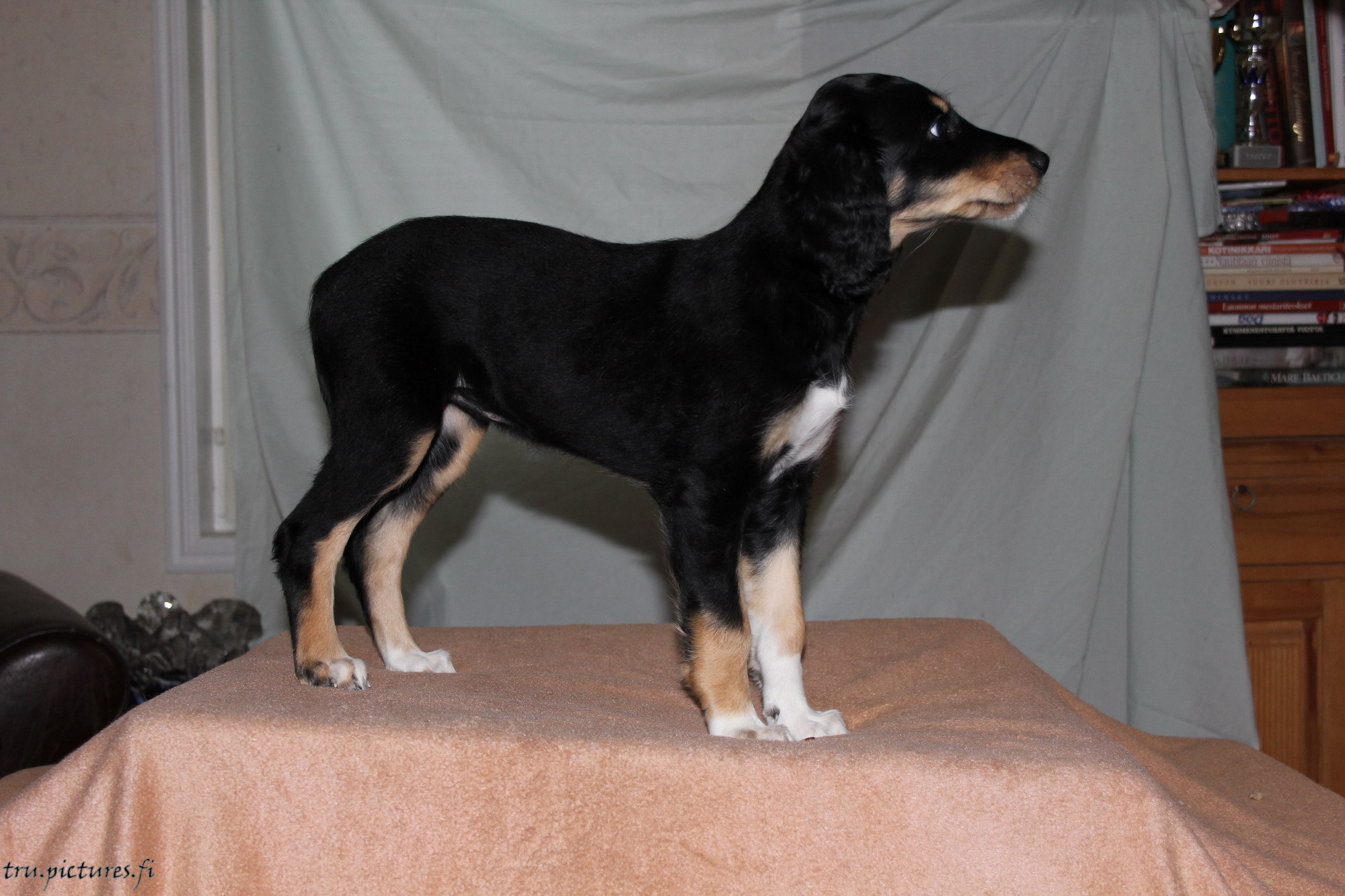
Qasiba 7½ weeks, Germany

Quadre 7½ weeks "Vili", Turku

Quanda 7½ weeks "Romi", Järvenpää

Quaneisha 7½ weeks "Ruska", Harjavalta

Quibilah 7½ weeks "Quilla", Sweden

Quinian 7½ weeks, Oulu

Quintessa 7½ weeks "Tessa", Sweden
The copyright for the puppy photos above has Taru Lehtonen.
The black beauties Quibilah or "Quilla" in Sweden and Qasiba in Germany were at photo sessions at an age of five months.
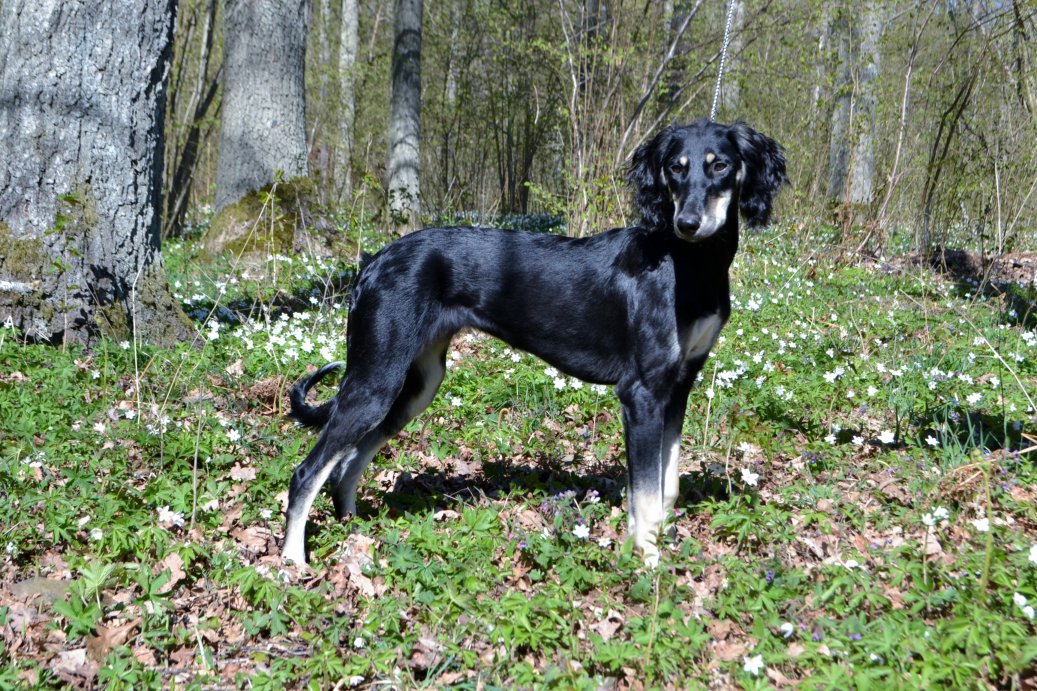
Quilla, copyright Matilda Jerner

Qasiba, copyright Katja Splittgerber
Qesarah "Pilvi" and Qandil "Pouta" were practising for dog shows the 15th and Quanda "Romi" the 18th of May 2014.
Pilvi, copyright Tuuli Soukka
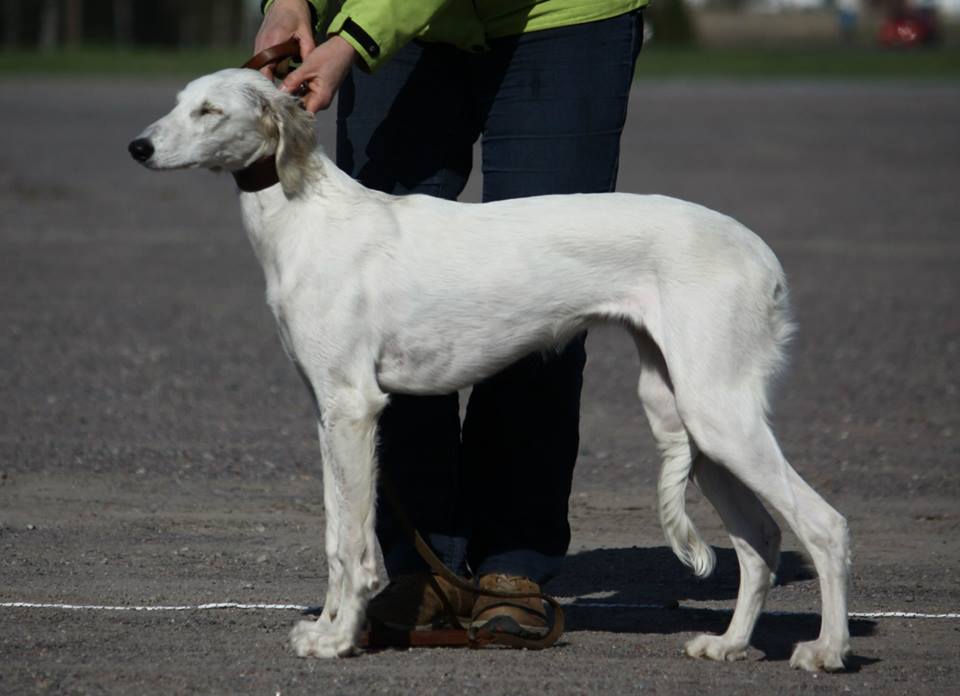
Pouta, copyright Tuuli Soukka

Romi, copyright Hannu Haapala

Tessa, copyright Ingela Johansson
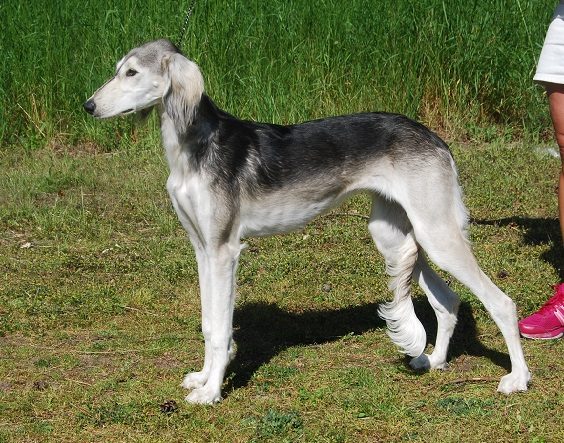
There are more photos of the puppies at the Facebook "Jari Latva-Rasku".
Suomenkielinen yhteenveto (Summary in Finnish)
Odessa sai 20.11.2013 9 pentua, joiden sukupuolet, värit ja painot olivat: valkoinen narttu kermanvärisin merkein 400g, grizzle narttu 445g, valkoinen narttu punasoopelein merkein 350g, "back & silver" narttu 440 g, "tricolour" narttu 400g, kermanvärinen uros 470g, "fawn, black fringes" uros 465g, punasoopeli uros 450 ja "fawn, black fringes" uros 425g. Suurempi fawn ja punainen uros olivat syntyessään väriltään ja muutenkin erittäin samannäköisiä. Muut pystyi helposti erottamaan värin ja merkkien perusteella.
Odessan ja Roopen tarina
Olimme vuonna 2006 ratajuoksun euroopanmestaruuskilpailuissa Jubbegassa Hollannissa. Odessan isä Malcolm voitti silloin kaikkien hämmästykseksi mestaruuden ja tutustuimme Ceshan Y-Shirvanin omistajaan Rudolf Böhmiin, joka taltioi tapahtuman videolle. Video päättyy, kun aurinko viimeinkin tulee sateen jälkeen esiin ja valaisee komean Ceshanin.
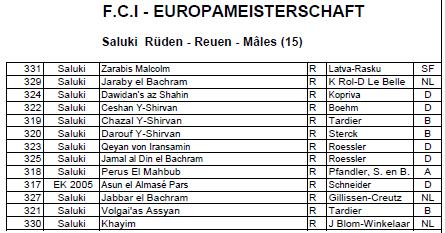
Talvella 2010 yritettiin Ceshanin ja Odessan äidin Alicen pentuetta Hampurissa, mutta astutusaika ilmeisesti oli matkan rasitusten jälkeen liian aikainen. Kun myös Zarabis Najatin ensimmäinen astutusyritys Tukholmassa epäonnistui talvella 2011, päätimme tuoda Suomeen Ceshanin belgialaisen pojan Khronos min al Asifen eli Roopen, nimenomaan Odessan sulhaseksi. Roope perusti kotinsa Lehmustojen luo Turun Paattisille Odessan syntymäinnostuneen veljen Hessun kaveriksi.

Roopen terveys ja muut ominaisuudet osoittautuivat odotusten mukaisiksi ja astutus lopulta päätettiin suorittaa syksyllä 2013. Yhdistelmä on monimuotoinen, sillä pentueen suvussa on ainutlaatuisen suuri määrä kantasalukeita ja tunnettuja eri yksilöitä. Roopelle ja Odessalle on suoritettu kattavat terveystutkimukset.
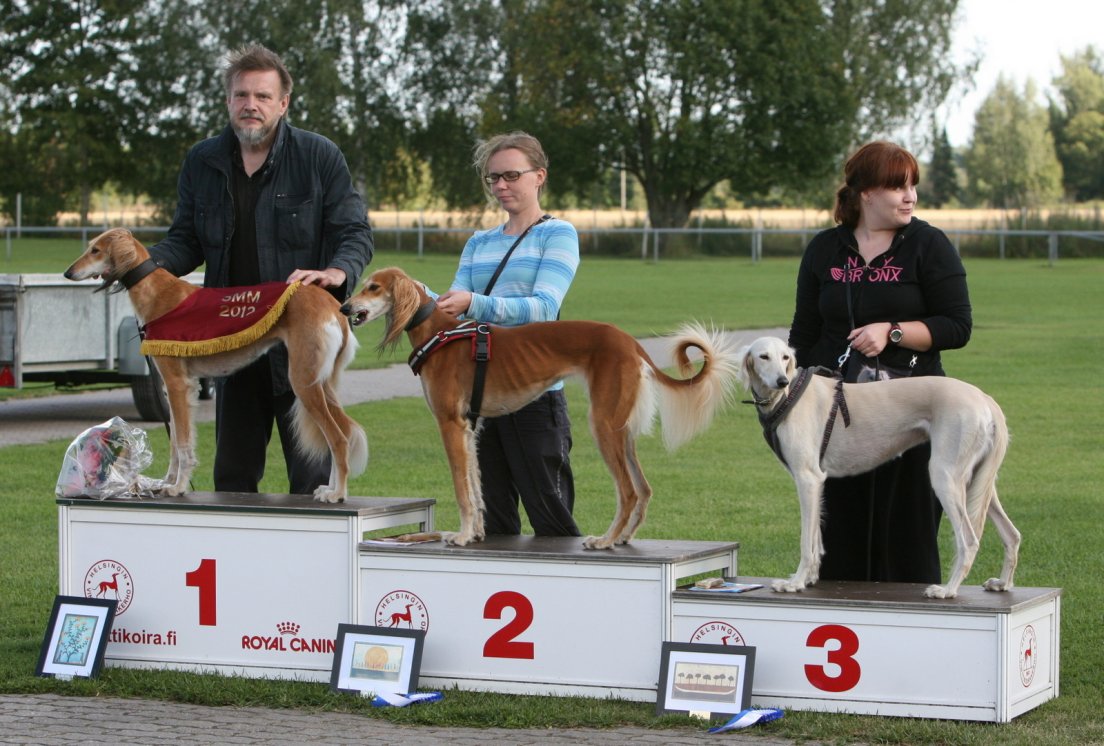
Odessa maastojuoksun suomenmestari vuonna 2012, SMM-12, kuva Minna Pikkarainen
Roope ja Odessa ovat harrastaneet pääasiassa vinttikoirien maastojuoksua ja menestyneet siinä hyvin. Kummallekin on tyypillistä erinomainen kestävyys. Roope juoksi lisäksi 12 hyväksyttyä ratajuoksulähtöä kaudella 2013. Pentueen vanhempien luonne on ystävällinen ja tasapainoinen. Vaikka vanhemmat ovat etäsukuisia, niiden ulkonäkö edustaa samaa tasapainoista perinteistä salukityyppiä. Roope on keskikokoinen salukiuros ja Odessa on jonkin verran keskimääräistä suurempi salukinarttu.

Roope maastojuoksun suomenmestaruuskilpailuiden 2. sija vuonna 2012, kuva Minna Pikkarainen
___________________________________________________________________________________________________________
Background
Odessa is owned by us and she was born as the oldest and biggest bitch of five in a litter of ten puppies.
Odessa has the same red colour as her father Malcolm and Odessa's height on shoulders is 66 centimeters.

Odessa in August, photo Jessica Bolander
Odessa is an easy going saluki, but demanding attention from her closest people. You may say in human words that Odessa is jealous.
Odessa has been a great lure coursing saluki and won her 1st lure coursing at an age of 1½ years and 1 day, and has attended lure coursing in Finland 27 times and has so far reached at least 4th position 23 times. Odessa is the winner of Finnish lure coursing championships year 2012.
Odessa was the 5th best lure coursing saluki at the TOP-list of the Finnish Saluki Club during the season 2010, and the best newcomer of the bitches. The total number of salukis that attended lure coursing during the season 2010 was the record high 147. Odessa was the second best bitch at the TOP-list of the Finnish Sighthound Association year 2010.
During the season 2011 Odessa was the winner of the lure coursing TOP list of the Finnish Saluki Club and the Finnish Sighthound Association. Odessa won the TOP list of the Saluki Club with the biggest point difference so far. Beside of Odessa the TOP list of the Sighthound Association included two sisters of Odessa among the six best bitches and three siblings of Odessa among the seven best males. Odessa and her brother Hessu were the leaders of the European coursing.eu TOP list of the year 2011. Odessa has also a racing license and Odessa has been running at a couple of races.
During the season 2012 Odessa was the second best lure coursing saluki at the TOP list of the Finnish Saluki Club. At the TOP list of the Finnish Sighthound Association Odessa became the 4th best bitch after her sister Oaisara.
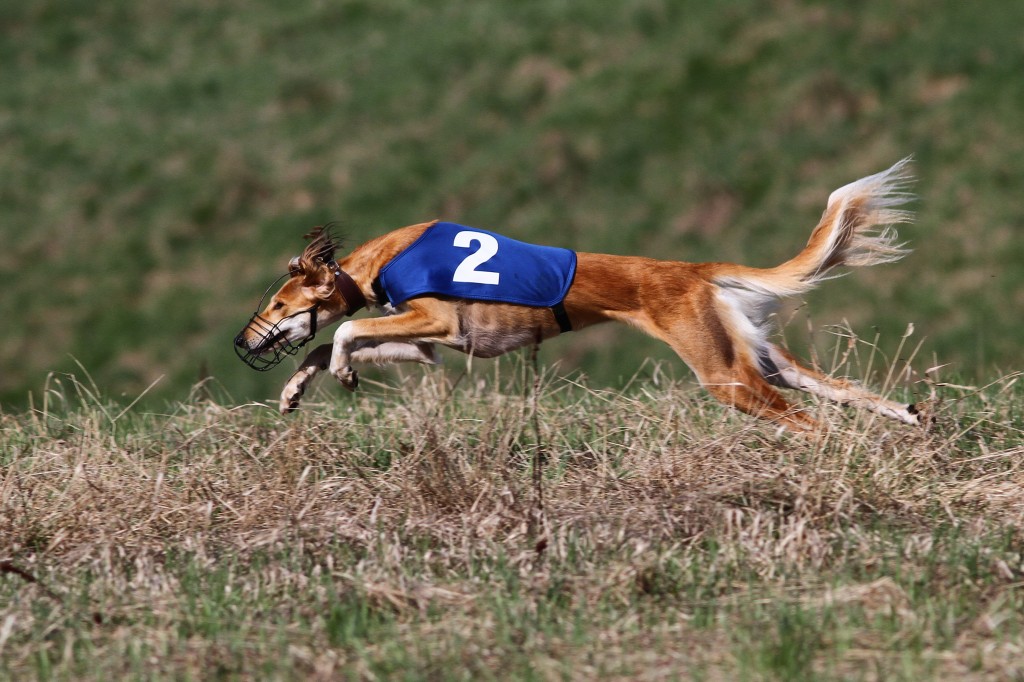
Odessa in May 2011, photo Jaakko Stenroos
The season 2013 ended up for Odessa when Odessa's mating season started early September. Although Odessa couldn't attend some major lure coursing events in the end of the season, Odessa's position at the TOP list of the Finnish Saluki Club was 6th and at the TOP list of the Finnish Saluki Association 8th. Odessa will have the right to attend the invitational Finnish lure coursing Cup already 4th time.
Odessa's inbreeding-% of 5 generations is 0% and for 10 generations 3,15%, number of foundation salukis in the pedigree is 48.
The father of litter is Ee Lv Lt Balt By JCh LtJW-12 Fi Ee Lv LCCh LvLCW-13 Khronos min al Asife

Khronos in April 2012, photo Ritva Latva-Rasku
Khronos was imported from Belgium in Spring 2011 and Khronos is co-owned by Kennel Zarabis and family Lehmusto Khronos is living with.
Khronos is coming from well-known beauty & performance saluki lines. Behind Khronos there are some of the most well-respected contemporary salukis from the countries of origin, especially from Iran and Turkey. The siblings of Khronos' father have been many times winners and among TOP-3 of European and World racing championships and also lure coursing championships, as also Khronos' grandfather from mother's side.
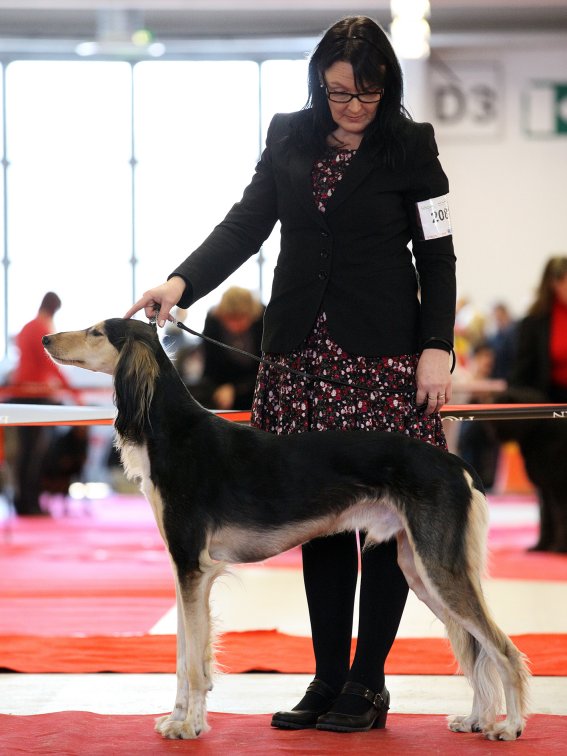
Khronos the 18th of January 2014 at an age of 3 years. Photo Pasi Soininen
Khronos has racing licence and Khronos has been able to run 480 meters in 33,90 seconds. Khronos attended lure coursing trials only during the part of the season 2012, but Khronos became the best saluki lure coursing male according to the TOP list of the Finnish Sighthound Association. During the season 2013 Khronos was the second best male. Khronos is Finnish, Estonian and Latvian lure coursing champion.

Odessa and Khronos the 2nd of September 2012, photo Marianna Villanen.
Khronos' and Odessa's fathers were running together at the European championships in Jubbega in Holland year 2006 when Odessa's father Malcolm became European racing champion. At the photo above you can see Odessa and Khronos running together lure coursing in Saue Estonia the 2nd of September 2012, and below the fathers Ceshan and Malcolm racing in Holland six years earlier, the 3rd of September 2006.

Khronos' father Ceshan Y-Shirvan and Odessa's father Zarabis Malcolm in Jubbega Holland year 2006.
The inbreeding-% (PawPeds) of the expected litter is for 5 generations is 0 % and the complete inbreeding-% for the whole ancestry is as low as 6,3 %, The number of foundation salukis in the pedigree is as many as 58. The closest joint ancestor of Odessa and Khronos is on the level of 6th generation. This saluki bitch is the legendary Boncuk from Turkey born year 1981, behind many successful show, racing and lure couring salukis all around the Europe.
| Khronos min al Asife & Zarabis Odezia, Inbreeding = 0,0% | |||
|---|---|---|---|
|
Ee Lv Lt Balt By JCh LtJW-12 Fi Ee Lv LCCh LvLCW-13 By Ch Khronos Min al Asife, black grizzle, 2011-01-15, Imported from Belgium 1 CACIL, 1 res-CACIL, 2 CACIB Father line Sahand von Iransamin, Iran 1989 Mother line Sheila of Amman, Israel 1921 (Nablous) |
LRS-06, -08, DKM-08, BRS - VDH-08, ID-08 S/L Ceshan Y-Shirvan, black grizzle, 2003-01-09, Germany |
De Ch De RCh De Ch S/L, ID 99, LRS Nord 00 Ilchan Tizpa el Taschara, tan grizzle, 1995-08-24, Germany | De RCh Sahand von Iransamin (Imp. Iran), grizzle, 1989-02-02, Imported from Iran |
| Gouhar el Taschara, grizzle, 1990-02-22, Germany | |||
| Thali Y-Shirvan, black & silver, 1995-07-28, Belgium | Lux VDH RCh, European and World Racing Ch Kerim el Riad, grizzle, 1992-02-10, Germany | ||
| Ch Baruffa el Bachram, black & silver, 6.10.1986, Germany | |||
| C.I.C. Bel LCCh Dordjouba min al Asife, grizzle, 2004-03-17, Belgium | C.I.B., NL, Bel, Lux VDH, DWZRV Ch, C.I.T. Fr Bel LCCh, Winner Holland Coursing Cup 05, European Coursing Ch 03, N.V.O.W. Ch S/L 05 Ejaddimimoun el Ghafiri, grizzle, 2001-10-22, Germany | C.I.B. Lux Ch, C.I.T. Dutch LCCh, Winner Holland Coursing Cup 97, 98, 00 Hamid of Kimberly House, 1996-01-10, Netherlands | |
| Cur'cuna el Ghafiri, black & silver, 1995-05-08, Germany | |||
| C.I.C. Vatoosa min al Asife, black & silver, 1997-02-13, Belgium | INT CH Fel-Fel des Hauts de Heurteloup, red, black fringes, 1990-09-24, France | ||
| C.I.C. Qari min al Asife, silver grizzle, 1992-02-15, Belgium | |||
|
Fi Ee LCCh SMM-12 Zarabis Odezia, red sable, 2008-11-08, Finland 1 CACIL 2 res-CACIL Father line Arabic Walad el Kharram, Egypt late 1940'ies Mother line Hoshah el Bahrein, Saudi Arabia 1920'ies |
C.I.C. Fin Ch, Fin LCCh, Fin RCh TS-06, -07, DV-06, SM-06, European Racing Ch 06, JK-06, PMM-07, VM-09 Zarabis Malcolm, red sable, 2003-01-03, Finland | NORD S FIN DK CH Yebelli's Emir, red sable, 1998-07-03, Sweden | NORD S FIN CH Kirman Kassim, golden, 1995-11-03, Imported from Finland |
| N S CH Yebelli's Chantie, red, 1993-03-09, Sweden | |||
| FIN S CH Asarafi Hierbabuena, cream, 1996-07-19, Finland | Ibinores Khashendi, cream, 1992-08-03, Imported from Sweden | ||
| FIN CH Asarafi Babuneh, black & fawn, 1988-02-01, Finland | |||
|
C.I.B FIN Ee Lv Lt Balt By CH RKFW Wallaby's Xeer Wi-Ijal, golden, 2005-08-03, Finland
|
FIN CH Tasia Eminence, black, white & tan, 2003-02-22, Imported from UK | GB CH Timaru Valkyrie of Jazirat, fawn, black fringes, 1997-04-30, Imported from USA | |
| CH Altaya Tasmayah at Tasia, fawn, black fringes, 1998-03-01, UK | |||
| Wallaby's Tab-Asir Tajila, cream, 2000-01-09, Finland | Pari-Was Arames-Tabasir, creme, wh. marks, 1996-01-28, Imported from Germany | ||
| Wallaby's O'Shalimar, liver grizzle, 1996-01-11, Finland | |||
Odessa and Khronos have attended heart scanning without signs of inherited heart diseases. The set of autoimmune (DLA haplotype) genes of Odessa and Khronos are different, and both are heterozygous. Odessa and Khronos have given their samples for their MyDogDNA passports. Odessa's Genetic Health Index is 102 and Khronos' 107. GHI for the puppies is expected to be on an excellent level of 106. Odessa's eyes haven been checked clear from inherited eye diseases.
The summany below explains the colour genes of Khronos and Odessa. Part of the colour genes are gene tested (MyDogDNA) and the rest are assumptions.The colour inheritance should be very simple, Khronos and Odessa are most likely able to have puppies with their own colour, black grizzle and red sable, with a probability of 50%. The puppies will have white Irish markings with dots on white of the colour of the main coat colour. We know that the fathers of Khronos and Odessa carry piebald spotting, therefore there is a possibility for particolour puppies or at least increased white markings. Golden colour is not possible and with the probability of 85% not black & tan/silver puppies either. We don't know if the parents carry cream. The colours of the puppies born were extended to the limits of the possibities. Among the 9 puppies there were 8 different colours.
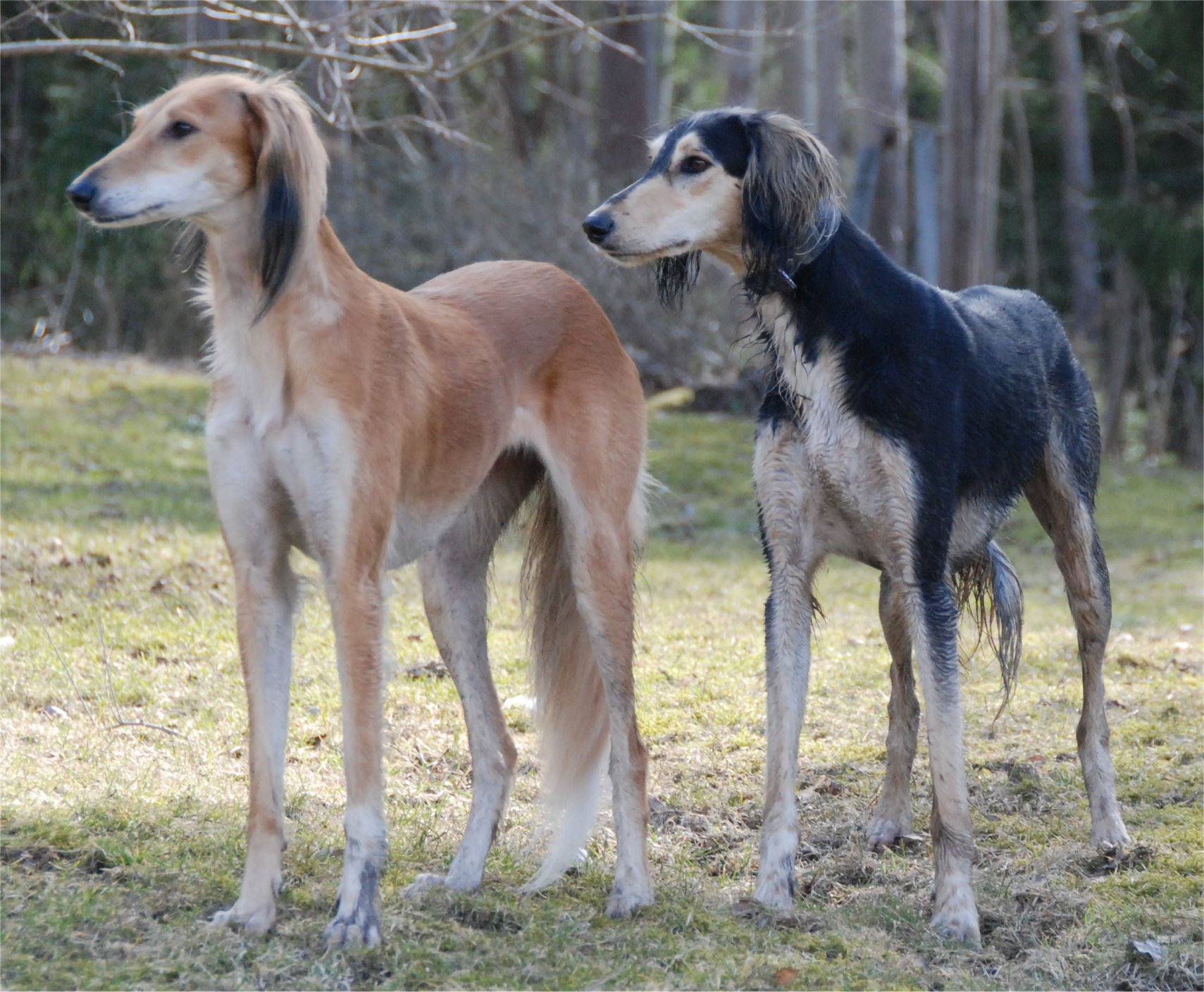
| MOST TYPICAL SALUKI COLOUR GENES PRESENT WITH KHRONOS AND ODESSA | ||
| Color Distribution | Khronos | Odessa |
| S - Self colour, full pigmentation - little or no white on the dog | no | no |
| si - Irish spotting - 5% to 30% white | yes | yes |
| sp - Piebald spotting - 20% to 80% white, *2=particolour | yes | yes |
| sw - Extreme white piebald - white all over except for ears | no | no |
| Colour Distribution Genes | Khronos | Odessa |
| KB - dominant black | no | no |
| kbr - brindle, causes stripes on red and bi-colour | no | no |
| ky - normal pattern of red and bi-colour | yes *2 | yes *2 |
| ay - red, dominant to tan points, *2 or *1+at=red or fawn (with black fringes) | no | yes |
| at - bi-colour (tan points), *2=black&tan | yes *2 | yes |
| aw - agouti, the "wild" type, very seldomly seen with salukis | no | no |
| T - ticking, dots on the white part of the coat | yes | yes |
| t - no ticking | ? | ? |
| Colour Expression Genes | Khronos | Odessa |
| EM - black mask | no | no |
|
EG - grizzle, visible if not dominant black, red or black mask present (there is no explanation why about 1/6 puppies of at+at parents are grizzle. The explanation might be that part of grizzles actually are "saddle tan" and grizzle is not dominant to E.) |
yes *2 | no |
| E - allows black if present due to other genes | no | yes |
| e - prevents black appearing anywhere in the coat, *2=golden | no | yes |
|
Colour Dilution Genes (the existence of C and D dilutions are based on assumptions) |
Khronos | Odessa |
| B - black (no dilution) | yes | yes |
| b - brown, *2=liver | no | no |
| C - full pigmentation | yes | yes |
| cch - chinchilla dilution, *2=cream | yes | yes |
| cd - extreme dilution | no | no |
| D - black (no dilution) | yes | yes |
| d - blue (all black is diluted to blue), *2=blue/grey | no | no |
You will find an example of a puppy temperament testing procedure as follows. You should be certain about that the puppy suits together with you, your expectations and your lifestyle.


